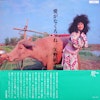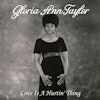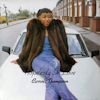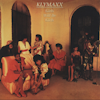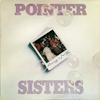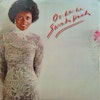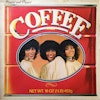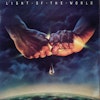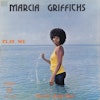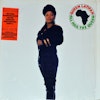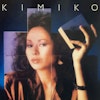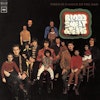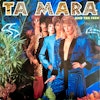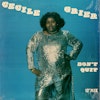To be honest, I thought I’d write about Nia Andrews the way I would any other artist, about the day I first discovered her syrupy alto—a voice with the sweetness of Minnie Riperton’s and the tonal dexterity of Carmen McRae’s. After lurking in the creative shadows behind larger than life artists Common, Lauryn Hill, and the Roots, the Los Angeles native singer-songwriter is transforming from quiet-Black-girl-jazz-musician into the industry’s go-to singer-writer-performing-artist. Worlds she once separated—writing, singing, composing, and acting—are now colliding like a burst of neutron stars: at first, quietly spiraling inward, almost unnoticeably, then suddenly outward—creating a magnetic field a trillion times stronger than that of its former orbit.
I thought I’d write about her, and the prestigious standards of Black American musicianship. About the legacy of her father, acclaimed jazz musician, producer and educator Reggie Andrews and his influence on those standards. But truth is, it’s hard to define Nia. A self-described empath, she feels. She sings. She loves hard. She hurts. The joys come, as the upbeat title track from her sophomore project From Here narrates. But what’s more evident than her subtle yet assertive command of the piano is the grace by which she transfers love and pain into a stellar nebula of sound. The stars are aligning for her right now. Finally. Lucky us.
It’s 3:30 A.M. in London. Nia sits across the table from me at a late-night diner on the forty-first floor of an East End skyscraper, eating greasy duck and waffles after playing her first acoustic set. I’m passing through the rainy city on the way to Paris—from where Nia’s just returned after shooting a television pilot. She stopped in Hamburg to headline Uber Jazz Fest before arriving in London to perform for an intimate crowd in Dalton. We talk about soul mates, Black churches, ’50s Harlem, ’60s politics. Eventually we land on musicianship. Eventually.

How many instruments do you play?
Not a lot. Piano. Guitar, bass. Guitar doesn’t come natural to me but I’ve always been attracted to piano since I was a baby. My dad’s a piano player. We have a lot of instruments at the house that I’m working on too. Drums, percussion (berimbau), Rhodes, Clavinet, a few keyboards, a flute…
Do you consider yourself a singer or musician?
I’ve always identified as a writer. I’ve actually over-identified as a writer. I’m still…stepping into owning being a singer, you know? The voice isn’t my primary instrument; I think I’m more of a storyteller more than anything. What makes sense to me is to use tone, the sonic journey…tell a narrative by setting a mood and feeling with an instrument. That makes me feel like not a “singer’s singer,” if that makes any sense. More of a musician first. I’m still working on being comfortable with the story my voice can tell.
You grew up in Inglewood, went to Locke High. The Locke High—
Yeah, in South Central. We all played in the jazz band at Locke—Kamasi Washington, Stephen Brunner [Thundercat], Terrace Martin… My dad taught jazz there; he taught all of us. Terrace actually has an album called Locke High. Kamasi didn’t go to Locke, but we had a multi-school jazz band and he would come after school and play in our band with us.
How much of that talent did your father transfer to you?
Not as much as everyone thinks. First, my dad was busy back in those days, teaching and producing music at the same time that I was learning to play keys. Second, I’m the seventh born of eleven children and I was like…really obsessed with the piano, but by the time I really got into it my parents were divorcing. My dad didn’t have as much time to mentor me, so I had to learn for myself. I picked up some music theory from my dad and took his jazz class, but he never gave me proper piano lessons or anything. He’d just toss me sheet music like, “Learn this.” And I’d have to figure that shit out. My dad had a reputation for being a hard ass.
Was he with you?
Oh, the most. People expected me to be brilliant because I was Reggie Andrews’s daughter, I mean, he’s taught everyone in L.A.—he was Patrice Rushen’s teacher, and honestly, his legacy is very deep as far as musicianship is concerned—but people didn’t realize that I didn’t have that mentor-mentee relationship with him. I was self-taught. So by anybody else’s standards, if they didn’t know who my dad was and they heard me play in high school they’d think I was a decent musician. But if they found out I was Reggie Andrews’s daughter? They’d be like, “What’s wrong with her? She should be brilliant by now.” I was a high school kid teaching myself to play by ear so I was looking like a real fuck up. By the end of senior year I felt so defeated I was like, “Fuck music, I quit,” and decided to go to UCLA for film school to be a [air quotes] “director.” By that time, Kamasi and Terrace were playing Hollywood Bowl. [laughs]
And you were working alongside the iconic cinematographer, Malik Sayeed.
Yeah… [thinks] That was a long period where I didn’t play piano or any music but was kinda music adjacent. With Malik, I was writing music video treatments, a lot of concept creation—stuff like that. I did that for years. I was so excited to be out from under my father’s shadow and just be on my own. Malik Sayeed… I mean this was the one of the best cinematographers in the country at the time who shot Belly, who was doing all of Hype Williams work, all the big artists—Alicia Keys, Lauryn Hill, Beyonce’s videos—and I was writing the treatments. I was fresh out of UCLA and loved the job, but ended up feeling such a void. Playing music is just…my nature. The more I wrote and gave ideas away to other artists, the more I felt I was getting away from who I naturally was as a musician. It got to the point where I was writing so much, a lot of the concepts that I was creating were really successful for a lot of those artists. So I’m watching them get VMAs and shit, and you know—take off, and I was at a fucking desk… I felt something had to change. So I moved to Brooklyn.
And hustled to get the job touring with Common.
Yeah, but I wasn’t singing back then. I was his assistant on the GO tour. I had a friend who knew me from writing treatments who was like, “Hey, I know you don’t want to be an assistant but Rashid really needs a creative assistant and from what he’s describing you’d really fit, the process is really competitive blah blah blah...” So after about a thousand interviews and a lot of hustle, I’m at my apartment in Bed-Stuy and I get a call from Common [in her Common voice] “Hey…it’s Common, but you can call me Rashiiiiid…” [laughs] So surreal! Then poof! We’re on the road for a year. He was a big reason that I started singing again.
I think I was at the show where he first brought you onstage. A festival, right?
Yeah! Crazy! You know I have a woo-woo jazz background so it didn’t matter to me that Rashid was a rapper, I used to make him warm up his voice just like a singer would. We’d sing together before he went on stage. Then we were at Bumbershoot [Festival] in Seattle, and out of the blue—he just called me to the stage, like, “Please make some noise for Nia Andrews!” And I’m like, “Nia Andrews? Who’s that? Not in front of all of these people! Is he serious!” My first time ever singing into a mic in front of anyone and it’s in front of thirty thousand people? I was standing right there backstage everyone could see me—I couldn’t run. And Rashid gestures to me, “Come on.” And I walk onstage petrified. Didn’t even know what mic to stand behind. Then the drums crack, and the music for “The Light” just start playing and I start singing, sounding like shit, looking crazy. [laughing] Thank God YouTube wasn’t cracking back then! But, yeah, Rashid just dropped me into the ocean and was like, “Here’s the mic. Swim.”
You spent all those years running away from being a musician—
Again, I’m the seventh of eleven girls. Eleven. And Reggie Andrews’s daughter—who was teaching Kamasi, Thundercat, Terrace…geniuses. I was always trying to prove that I was good. I was never good enough, or never felt I was. I needed those years to prove to myself that I could do it.
You’re composing now?
Not the stuff that’s out. On Colors, I worked with Deron Johnson and Andrea Remanda. On the EP [From Here], Mocky produced with me on that one. But the new stuff, yeah, I’m composing and arranging it.
Why not compose your own work from the beginning?
Because I really enjoy collaborating. Having been a writer for so many years and being stuck in that lonely ass hole that writers go into, it was nice to come out and work with people who really got where I was going with my music. And me and Mocky just vibed. Musically, spiritually. Also, you have to remember, I wasn’t playing piano as much then, so I didn’t have the facility to get my ideas out the way I wanted. I just hadn’t gotten to a place where I felt like I sounded good enough. Back in high school, the piano was the first to break my heart. First to chip away at my self esteem. My first real break up. So getting on keys again…was like seeing an ex-lover after years of separation. I didn’t trust them just yet. Now, we’re dating again. [laughs]
You’re featured on Solange’s A Seat at the Table. There aren’t too many guest stars on the album. How did you find one another?
She met me as a writer. I was in the process of recording From Here but still writing music video treatments to survive. She’s dope, dude. When I met her, as a person, she was a breath of fresh air. I felt an immediate kinship. I honestly don’t know about At the Table, though. They’re super on the low about their processes. I remember reaching out to St. Heron about my EP. They ended up doing an interview with me for it. Then, I’m making chai in my kitchen and Solange texts me, and I’m like, “…Shit. Really?”
Do you think we’re entering or exiting a renaissance period in Black music?
I think it’s dope that Black people right now are in this super woke trend. Some of us have always been “woke,” but now I feel like Black people feel like we have more permission to explore our pain more directly. Frustrations have mounted and that’s being reflected in the work. We’re seeing Black women with natural hair everywhere, even here in London we’re reclaiming our natural beauty, and that changes things, that makes us more celebratory. But at the same time our culture is being appropriated more than ever before and exploited. And sometimes we take for granted what we naturally create and what we have. We don’t protect it as much.
And now with social networking giving a window into our conversations—
Things that were in private and communal in the past, or even sacred—now we hear everybody taking on Black-isms. To try and make themselves sound more cool or whatever. My offering of an artist is the subtlety and the nuance of what it means to be a Black woman—the tenderness not just the strength. I feel so Black and have always felt super soulful, super connected to the ancestors—Black as fuck. It’s so trendy to be woke now. I don’t need to announce or exploit my legacy.
In the last few months, you’ve played Paris, London, Hamburg; is the reception for you in Europe better than in the States?
I wouldn’t say better. But traditionally, the U.S. is slower to catch onto certain types of artists. Right now I’m being pulled towards Paris, London, Berlin…New York. Those are the cities that seem to want to spend the most time with me, that have created the most space for me and really get me as an artist. I feel like London gets the softness of my music and the “Black womanness” of it. Paris wants the jazz and the legacy and the soul. They want it raw and untouched. Brooklyn is unapologetically Black, and they let me be Black. London is unapologetically soulful and honest, and they let me be soulful and honest. If I want to do a ’70s soul cover or some Charles Stepney shit, they not only let me do it, they celebrate it. My Blackness is celebrated here. Maybe better understood. So I want to spend more time in those places. I’m headed to Switzerland this spring to perform for Gilles’s [Peterson] Worldwide Festival in Leysin. I just want to keep traveling and sharing my music. I don’t want to have to fight to belong anywhere. I just want to go to where I’m loved and make music, man. I’m real simple in that way.
How are you approaching the next project? Where’s your energy focused?
On giving myself permission to be free. On finding safe spaces and creating for myself within them. As the quiet one, as the overlooked one, the girl in the band with all of the super talented jazz boys, the one behind the scenes writing for other artists, it’s been a long hard journey to finding my own voice, to moving to the front. There’s not often a lot of space to celebrate the quiet Black girl. She always gets lost in the shuffle. I’m here for her. And I’m just creating that space for myself to breathe and play and live. Just been feeling good being at home in my recording space, playing bass, playing guitar, playing keys, playing these songs…playing these shows. It’s been very surprising to me to be like, “Whoa. I created this.” [thinks] I just want to live and love and celebrate that shit.
